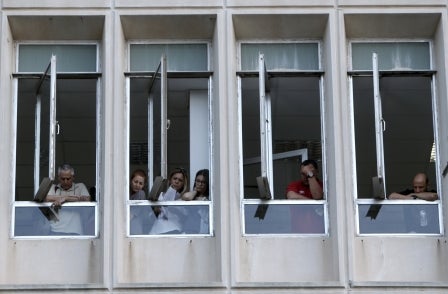
Employees of suspended Greek state broadcaster ERT have refused to leave its Athens headquarters and are continuing to broadcast via a live webstream.
Staff are occupying the ERT building despite a police order to vacate and technicians have managed to upload a television signal onto an analogue transmitter.
Greek economics professor Yanis Varoufakis spent the night at ERT and blogged about the experience.
He said: “The totalitarian manner in which ERT was closed down was a crime against all civilised people the world over.
“Who is to say that ERT’s dismantling cannot be the blueprint that will lead to the privatisation of the BBC, of the ABC in Australia, of CBC in Canada?”
Demonstrations in support of ERT are being planning for this afternoon in London and Paris, according to Twitter users.
The Greek government suspended state broadcaster ERT yesterday, in what newsreader Antonis Alafogiorgos called "a blow to democracy".
Shocked broadcasters, who had learnt of the decision only moments before, announced that viewers’ screens would be going black that evening as ERT channels were pulled from the air.
Thousands of protesters, including many of the 2,500 employees being laid off, gathered outside ERT’s Athens headquarters.
Speaking to the BBC, ERT journalist Katerina Ioannidou said: “We gave our lives, our souls for a proper news station.
“We spent nights here that we will never get paid for – we have been unpaid since November, all of the staff who worked so hard here.
“All that effort is gone, wasted – they are throwing us out just like that. It’s a disgrace.”
Government spokesman Simos Kedikoglou cited tough austerity measures as the reason for closing ERT, calling it a "haven of waste".
The government announced that the closure was a temporary measure, and that ERT would return with a much smaller workforce.
Speaking to the BBC, Panagiotis Lafazanis, a prominent member of opposition party Syriza, said:
“The government is nullifying parliament, in essence it is nullifying democracy.
“The closing of ERT is not only a coup, it is like closing down Greece.”
The European Broadcasting Union has urged the government in Greece to reverse the decision to suspend ERT.
In a letter addressed to Greek prime minister Antonis Samaras, President of the EBU Jean Paul Philippot and Director General Ingrid Deltenre wrote: “While we recognize the need to make budgetary savings, national broadcasters are more important than ever at times of national difficulty.”
ERT, which translates as the Hellenic Broadcasting Corporation, began broadcasting in 1938, originally in the form of radio services from Athens.
Full television service began in 1966, and over the years another two channels have been added.
Email pged@pressgazette.co.uk to point out mistakes, provide story tips or send in a letter for publication on our "Letters Page" blog

